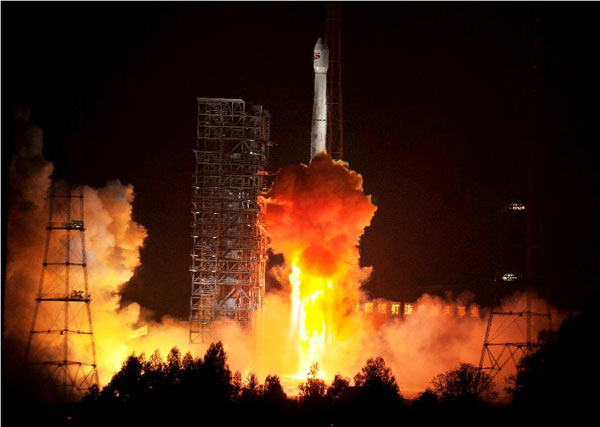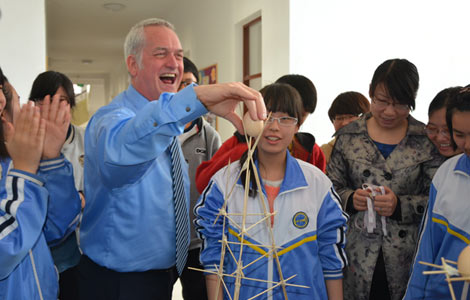China launches communications satellite for Bolivia
Updated: 2013-12-21 03:19
(Xinhua)
|
||||||||
|
 |
|
A Bolivian communications satellite is launched from the Xichang Satellite Launch Center(XSLC), southwest China's Sichuan Province, Dec. 21, 2013. China successfully sent a Bolivian communications satellite into orbit with its Long March-3B carrier rocket at 0:42 a.m.(Beijing Time) Saturday. [Photo/Xinhua] |
XICHANG - China successfully sent a Bolivian communications satellite into orbit with its Long March-3B carrier rocket from southwest Xichang Satellite Launch Center at 0:42 am (Beijing Time) Saturday.
Bolivian President Juan Evo Morales Ayma was present, the first time a foreign head of state has witnessed a satellite launch in China.
The satellite was produced by China Aerospace Science and Technology Corporation (CASC) with a designed longevity of 15 years. It is Bolivia's first communications satellite.
The satellite is named Tupac Katari in homage to an 18th century indigenous hero who fought Bolivia's Spanish colonizers.
Chinese President Xi Jinping sent a message of congratulations to President Morales, saying the successful development and launch of the satellite represents the latest achievements and level of cooperation between China and Bolivia in the field of science and technology.
"The satellite will play an important role for Bolivia to improve its broadcasting, education and medical services. It will make important contributions to promote cooperation between China and Latin American countries," Xi said.
Bilateral ties have been progressing smoothly while pragmatic cooperation in all areas are making steady headway since China and Bolivia established diplomatic ties 28 years ago, Xi said.
Xi said China hopes for more space collaboration with Bolivia, which will promote mutual beneficial cooperation and friendly relations, bringing benefits to the people of both countries.
In a speech made after the launch, President Morales thanked President Xi for his congratulations and expressed gratitude towards the Chinese government, scientists and the people. He hopes that China and Bolivia will take the opportunity of the successful launch to deepen cooperation in all areas and bring bilateral ties to a higher level.
The satellite agreement was signed between the Bolivian Space Agency (ABE) and the Great Wall Industry Corporation of China, a subsidiary of CASC, in December 2010.
It is the fifth Chinese communications satellite for international users and the second in-orbit delivery for a Latin American customer. China launched a telecom satellite for Venezuela in 2008.
The successful launch will bring Bolivia into an age of digital economy and make its people more connected, said Ivan Zambrana, head of the ABE.
"We wish to launch a remote sensing satellite in 2017 and China is one of our best alternatives," he added.

 A return to motherhood at 60
A return to motherhood at 60
 AK-47 inventor Mikhail Kalashnikov dies
AK-47 inventor Mikhail Kalashnikov dies
 Oil spill from Qingdao blast kills sea life
Oil spill from Qingdao blast kills sea life
 Ice storm hits Toronto
Ice storm hits Toronto
 A man and a child jump off Manhattan building
A man and a child jump off Manhattan building
 Male nurses in demand as caregivers for elderly
Male nurses in demand as caregivers for elderly
 Moving beyond language skills
Moving beyond language skills
 Khodorkovsky says he will not enter Russian politics
Khodorkovsky says he will not enter Russian politics
Most Viewed
Editor's Picks

|

|

|

|

|

|
Today's Top News
China's top 10 scandals in 2013
LA Winds blow into China
Private clubs are targeted by anti-graft campaign
China makes it easier to sue government
China promotes core socialist values
China deliberates adjusting one-child policy
Washington tries to shift spying blame to China
Swift justice urged for murder case
US Weekly

|

|







